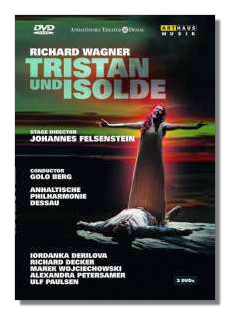
The Internet's Premier Classical Music Source
Related Links
- Wagner Reviews
- Latest Reviews
- More Reviews
-
By Composer
-
Collections
DVD & Blu-ray
Books
Concert Reviews
Articles/Interviews
Software
Audio
Search Amazon
Recommended Links
Site News
 DVD Review
DVD Review
Richard Wagner

Tristan und Isolde
- Tristan – Richard Decker
- Isolde – Iordanka Derilova
- Marke – Marek Wojciechowski
- Kurwenal – Ulf Paulsen
- Melot – Kostadin Arguirov
- Brangänge – Alexandra Petersamer
- Ein Hirte/Ein Juner Seemann – Jörg Brückner
- Ein Steuermann – Nico Wouterse
Dessau Anhalt Philharmonic Orchestra/Golo Berg
Johannes Felsenstein, stage director
Stefan Rieckhoff, set and costume design
Recorded live, Anhaltisches Theater Dessau, 2007
Arthaus Musik 101325 2DVDs LPCM Stereo Dolby Digital DTS Widescreen Anamorphic
I say this as no great revelation to many readers: there is no more – in fact probably less – action in Wagner's operas than in those of Verdi, Puccini and others. The fact that Wagner's operas are generally twice as long as most of the others owes everything to his tendency to plumb the depths of his characters' minds and emotions, and of wringing out the last ounce of profundity from his stories. Wagner wants the viewer to feel the suffering of his characters, their joy, their frustration, and their triumphs. Any performance that conveys these feelings this with general success, especially in Tristan und Isolde, must be counted a fine one. This new Tristan, from the Anhaltisches Theater in Dessau, Germany, is a good performance indeed. The principals in the cast are all good. I especially like the Brangänge of Alexandra Petersamer, and judging from the audience's reaction when she took her bows at the end, they did too. Iordanka Derilova (pronounced, Yordahnka Dair-ree-luhva) has a beautiful voice and delivers a heartrending Isolde. Neither she nor Richard Decker, who sings Tristan, is a household name, but on the evidence here, I would say they deserve greater recognition. Decker sings well throughout, though he seems to be uncomfortable when he's singing while lying on his back, dying in the last act. Still, though he shifts a bit uncomfortably now and then, he manages well enough, deftly conveying, in fact, the sense of struggle that Tristan is experiencing. Marek Wojciechowski delivers an imposing King Marke and Ulf Paulsen's Kurwenal is also quite convincing.
This is the third Tristan I've reviewed in about the last two years here at Classical Net. I was very impressed by the first of them, on Opus Arte, that featured John Treleaven and Deborah Polaski in the leads and Bertrand de Billy conducting, but found the second, also on Opus Arte, that featured Robert Gambill and Nina Stemme in a Glyndebourne production led by Jiří Bĕlohlávek, even better, the best, in fact, that I had ever encountered. This new one then goes up against stiff competition, but comes off well. It's hard to rank these productions, but as far as the singing and orchestral work go, I would say the new one falls just short of the Bĕlohlávek.
Oddly, the sets to both of these productions are bleak and not dissimilar. The action takes place in the Anhalt production on a circular sort of stage that comes out in front of the orchestra. The way the production is filmed, the orchestra can be seen in the background throughout, with scenery just above them. It's a slightly distracting yet haunting sort of effect, but also comes across as perhaps just a little cheap-looking: the sets are rather barren with little else on the stage but the characters; so perhaps someone in charge decided to make the orchestra part of the scenery to fill things out a bit. I hope that this person in charge wasn't trying to send the message that Wagner's orchestra is utterly vital to the work – as if we don't know that. In any event, the production works, at least for me.
One oddity about the performance: the English Horn player, who by the way delivers splendid work in the last act playing the "ancient" shepherd melody, stands during her performance and can be seen quite clearly several times. At the end of the opera, she is called on stage with the conductor Golo Berg and the singers to take her bows. I looked to see her name in the booklet and in the credits on the DVD, but alas, she's nowhere listed. However, at the theater's website I think I tracked her down: she is Almut van Drüner. I've gone to the trouble to credit her, since she deserves recognition here for her fine work.
The orchestra plays well too, and Golo Berg, another non-household name here, conducts with authority in this difficult Wagner work. His tempos are generally brisk, finishing ahead of the Bĕlohlávek by 13 minutes and the de Billy by 25 minutes. Quite a difference, but he makes an excellent case for his quicker tempos. The sound is excellent for the singers throughout, but the orchestra is a little distant and has a more shallow sound. In the end, one must count this as a fine Tristan, one that is worth the effort of committed Wagnerians to purchase.
Copyright © 2009, Robert Cummings




















